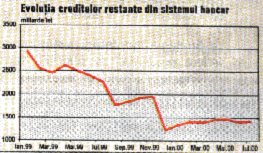 Defaulted1 short term loans2 in the banking system amounted to3 1.458 trillion lei at the end of July, 2000, which represents a decline of 36,4% in comparison with the same period in 1999, according to data furnished by the National Bank of Romania (NBR). In absolute terms, the decline was 836 billion lei. Such results are due4 increased supervision in the banking sector as well as efforts by Romanian banks to reduce the number of crony-oriented5 loans in their portfolios, so as to avoid bankruptcy6.
Defaulted1 short term loans2 in the banking system amounted to3 1.458 trillion lei at the end of July, 2000, which represents a decline of 36,4% in comparison with the same period in 1999, according to data furnished by the National Bank of Romania (NBR). In absolute terms, the decline was 836 billion lei. Such results are due4 increased supervision in the banking sector as well as efforts by Romanian banks to reduce the number of crony-oriented5 loans in their portfolios, so as to avoid bankruptcy6.
The decline could be felt7 both among private and State-owned8 companies (-543 billion lei and -252 billion lei respectively), as well as among the population (-18 billion lei).
The trend9 for short term loans remaining overdue10 in the first half of this year indicates an increase11 of about 200 billion lei, due mainly to a large amount12 of accumulated, uncollected interest13. However, this increase was outpaced14 by inflation and the leu's devaluation15, which is the reason that, overall, "bad debt" in the banking system has declined16 in real terms.
Overall, this figure17 has fallen considerably from June 1999 to June 2000 due to the above reduction in short term18 bad debt19, the maintenance of approximately the same level of long-term20 bad debt (941 billion lei), as well as an increase in assets21 in the banking system (22% by those of domestic22 banks and 68% by those of foreign23 banks).
The reduction in the risk in Romania's banking system as a result of these indicators was emphasized24 yesterday by the Governor of the National Bank of Romania, Mr. Emil Iota Ghizari, at a hearing25 with the Commission for Reform, Privation, and Economic of the Chamber of Deputies. It is expected that the commission shall soon be voting on a series of further measures to continue to strengthen the security of the banking system.